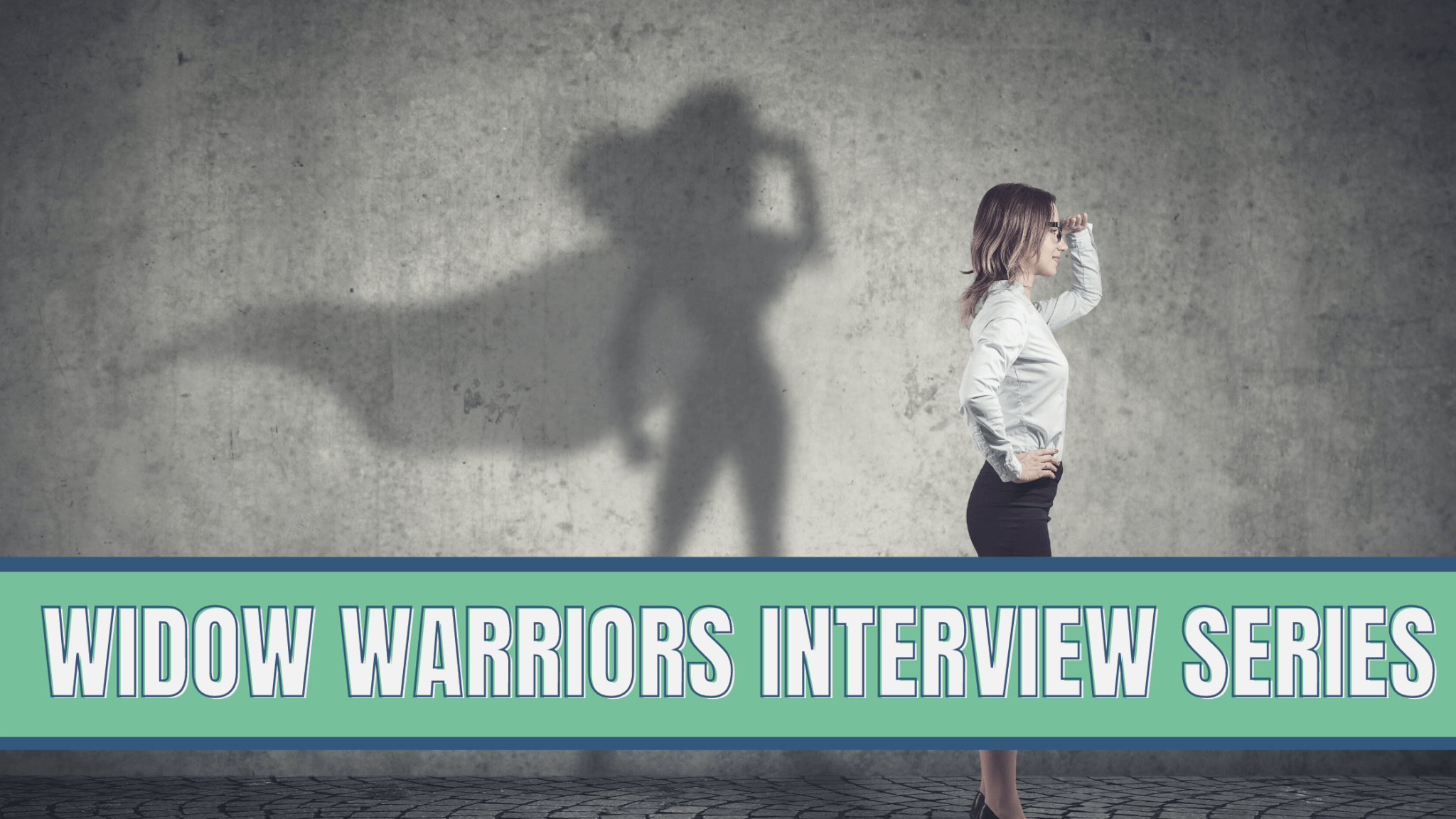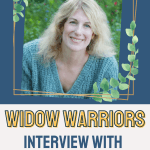Widow Warriors – Debbie Weiss

Short and Sweet Summary: In this series called Widow Warriors – Life After Widowhood, I interview widows who share their stories about how they’ve moved forward with grace, jumped out of their comfort zone and accomplished extraordinary things. These widows are here to show you the way. To help you see a sliver of light where there wasn’t any. Here’s the story of one of our amazing widow warriors-Debbie Weiss.
As a part of this interview series, I had the pleasure of interviewing Debbie Weiss.
I asked Debbie to share her story because she’s so freely and vulnerably shares her widow escapades on her blog, The Hungover Widow, and in her many essays published in The New York Times “Modern Love” column, HuffPost, Woman’s Day, and Reader’s Digest, among other publications. Her memoir, Available As Is: A Midlife Widow’s Search for Love is her candid account of dating as a middle-aged widow.
I find her honest and refreshing and you can’t help but love a widow who “tells it like it is!”
Here’s a bit of background before we begin:

What’s your widow story? Can you tell us when & how your spouse/partner died?
I had 32 years with my high school sweetheart, George. His mom and my dad worked together
as scientists and we met at his parents’ pool party when I was seven and he was eleven. We
started dating when I was a high school senior and lasted through his becoming an engineer
and my becoming a lawyer.
In 2009, he went to the hospital with a sore on his chest that wouldn’t heal and we found out he
had metastasized male breast cancer. He excluded me from his treatment, driving himself to
chemo and radiation and not including me in his visits to his doctors. I believe he was trying to
protect me because my mom died when I was ten at the same hospital where he was getting his
medical treatment.
We had three good years together, but in late 2012, the cancer took over and his body declined.
The hardest part was that he went into denial, believing he was recovering even as he was
dying. So he declined palliative care and other types of help and we never had a real goodbye,
which was the hardest part.
He died on April 10, 2013.
What was life like for you in those early days post death?
I went into lawyer-mode from the start, so I was very efficient, organizing paperwork and dealing
with all the bureaucracy. But I had Post-Traumatic Stress Disorder which came out at night with
anxiety attacks and insomnia. I’d drive over to my dad’s house in the middle of the night–he
lived ten minutes away–so I didn’t have to be alone in my house.
George and I didn’t have any kids and we’d been pretty anti-social, so when he died I was alone
for days on end except for my dad and stepmom. I’d retired from practicing law years before. It
was all surreal, like my home had turned on me and everything felt really off-kilter.
What surprised you the most about your grief?
The loneliness surprised me the most.
George and I had been each other’s best friends. He was my life and I’d been okay with that. But without him, I could go days without speaking to another person and I think that led to my anxiety attacks. I was shocked by how isolated I was even though my life hadn’t seemed that lonely in the past.
Did you seek any support options like grief support groups or therapy? What was the most or least helpful and why?
I did attend grief therapy sessions with a woman therapist who was in her early seventies and had been on her own for a long time. She was so encouraging with practical advice, like telling me to join groups to meet people and to be open that I was a widow. She helped me to leave the house and to reach out to people.
What’s your work situation like? Did you work prior to or after your spouse’s death? How has that helped or hindered you?
I was a practicing lawyer at 25 and “retired” with burn out at age 40.
When George died, I hadn’t worked in nine years. My work was in insurance coverage, and it was intellectually demanding so I don’t think I could have handled it after my loss. Plus, the cliché that lawyers are jerks is kind of true–when people asked why I retired so young, I’d tell them I didn’t want to work at a job where people were mean to me all day. I couldn’t have coped with the animosity and stress when George died.
But not having a job to go to or work colleagues to socialize with added to my isolation. A few years after my loss, I tried working in a bookstore to get out and interact more, but I was kind of a disaster at retail. I never could figure out the computer inventory software!
Did you experience any physical or mental setbacks? What was that like and how did you recover?
The first year after my loss, I had anxiety attacks at night which felt like I couldn’t breathe and
the room was spinning. At first, I’d go over to my dad’s house—I’m lucky he’s a night owl–but
later they got better with grief therapy. My therapist explained they were a symptom of my
PTSD.
Also, the first year, I couldn’t eat normally. I’d either eat hardly at all or eat a whole lot at once, and I was really thin. But again, my eating habits improved with time as I got over some of the anxiety and stress.
What coping strategies do you find the most helpful?
Grief therapy was super helpful, but it required a good therapist I could relate to. I also went to
yoga a few times a week which helped me with breathing and exercise to reduce stress, and
even more importantly, it gave me a community of women.
I also joined a writing class, since I loved to write, and that also helped me to be less lonely and
to provide an outlet for my feelings. In general, as someone without many connections, joining
groups to do things that interested me, like travel and hiking, helped me the most, both to find
people to be with and to discover that life could be good post-loss.
Did you make any major life changes after your spouse died? Can you elaborate on what changes you made and how you feel about your decision now?
I was honestly pretty inertial after George died in terms of major changes.
I stayed in the same house we’d lived in together and didn’t move until 2021 when I realized I wanted to live by the water. In retrospect, I think I’d have been happier moving sooner and being in a fresh place without all the memories, but it wasn’t until last year that I realized what I wanted in a new home and a new community.
I did start to reach out far more than when I was married and that has been for the good. I got a
Master of Fine Arts in writing in 2020, six years after my loss, but for me, a big decision like that came after years of doing smaller things like taking weekly writing classes. Since my life
revolved around George, I think it took me a while to figure out how I wanted to be without him.
When and how do you think your healing truly started?
I think it’s hard to understand that after a devastating loss, the healing comes in fits and starts,
at least it did for me. For example, I’d say my healing started about four months after my loss
when I started working with a volunteer writing teacher and began to write again, which I’d loved
to do before George’s illness and which gave me an outlet to talk about everything I’d been
through with his denial.
But I also started dating too soon after my loss. That wasn’t good for me. So the healing
process was more like trying things – some helped and some didn’t
How did you decide to turn your negative experience into a positive one? Were there any “aha” moments that stand out to you?
My father is my role model in deciding to turn my negative experience around.
He lost my mother when I was ten and he was 42. He went on to date and travel and study Buddhism and have a truly interesting life. Initially, I wanted not to worry him when I lost George so I tried to join groups and venture out so he wouldn’t be concerned.
But during the second year after my loss, I did have an “aha” moment when I realized my life
would be what I made of it and I was lucky enough to have the health and resources to do
things I wanted, like travel a bit and study writing.
What is the most important thing you’ve learned about yourself as you cope with widowhood?
I’m pretty resilient, having gone through both my mother’s and husband’s early deaths
and come out with gratitude and joy (at least some of the time).
Are you dating and/or remarried? How and when did you decide to start a new relationship? What’s the best thing about your partner?
I’ve been in a relationship for about four and a half years.
We moved in together last year into a new place and I sold the home I’d lived in with George. I’d been dating, on and off, for about five years. When I met my current partner, I’d almost given up hope of finding a second love.
The best thing about my partner is his capacity for joy and his innate sense of happiness. So
many of the men I met when I was dating were so disillusioned with how their lives had turned
out, it was a pleasure to meet someone who still loved life.
How are you living your best life now? What’s the key to moving forward with grief?
I’m living my best life with having gotten a master’s in creative writing at age 56 and working
with an editor to write my book and make it the best I could. I’m loving living in a small town by
the water, which had been a dream of mine, with my second love.
My keys to moving forward were perseverance and taking small steps forward, hoping they’d
lead to bigger changes. These included continuing to date online when I had almost lost hope
and continuing with writing, moving from a weekly class to a graduate program and, ultimately, a book. My memoir, Available As Is: A Midlife Widow’s Search for Love was published in 2022.
If you could go back and share one piece of advice to your newly widowed self, what would you say?
I’d tell my newly widowed self to be more gentle and less self-critical. I wish I’d treated myself as
a dear friend in need of comfort instead of someone who kept getting things wrong. Making
changes necessarily includes things not working out sometimes.
You can find more of Debbie online at:
Website: The Hungover Widow
Facebook: Debbie Weiss Author
Instagram: debbie_weiss_author
Twitter: DWeissWrite
Want to read more Widow Warrior interviews?
Click here for all the Widow Warrior interviews – conveniently listed on one page!

